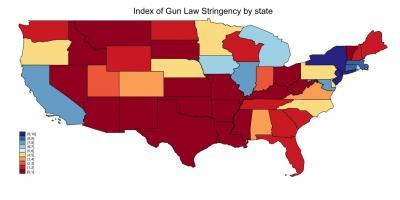PROVIDENCE, R.I. [Brown University] -- Every state in America legislates its own gun laws, but not without significant spillover effects on nearby states, according to a new study by Brown University economist Brian Knight. In a National Bureau of Economic Research (NBER) working paper, Knight presents the first state-by-state gun flow analysis. The results indicate that illegal firearms flow from states with weak gun laws to states with strong gun laws, suggesting that traffickers are responding to differences in gun laws across the states.
Using gun tracing data from the Bureau of Alcohol, Tobacco, Firearms and Explosives, which identify the source state for crime guns recovered in each of the 50 states, Knight constructed an import-export matrix to measure the state-to-state gun trafficking flow. Knight then classified each state on a scale of weak-to-stringent gun regulation using 10 laws deemed significant in terms of reducing trafficking by Mayors Against Illegal Guns, including legislation on straw purchasing, background checks, and required reporting of lost or stolen guns.

Traffickers tend to move illegal guns from states with weaker gun laws (red-hued) into states with stricter gun laws (blue-shaded).
(Photo Credit: Image courtesy of Mayors Against Illegal Guns, 2010)
Knight's main findings:
- Trafficking flows respond to gun regulations, with guns flowing from states with weak gun laws into nearby states with strict laws.
- Proximity matters: Trafficking flows are more significant between two nearby states than between two distant states. Thus, a weakening of gun laws has a more significant effect in nearby states.
- The fraction of crimes involving a gun tends to be higher in states exposed to weak gun laws.
A specific example of these spillover effects, or externalities, demonstrated in Knight's analysis is the illegal gun flow into New York, a state with stringent gun laws. The largest firearm importers to New York are Florida, Georgia, and Virginia -- three states in relatively close proximity and with relatively weak gun laws. Knight says the greatest flow of guns is from Indiana to Illinois, with more than 1,000 guns recovered in Illinois in 2009 that originated in Indiana. "Presumably, that's because Indiana has relatively weak gun laws and is right on the border of Chicago," he said.
"This analysis suggests there would be benefits associated with having more federal control over gun policy, particularly because the federal government is going to better internalize these types of cross-state spillovers," said Knight. "On the other hand, there would be a cost of further federal interventions, as a key advantage of decentralization involves the ability of states to tailor policies according to local preferences."
Source: Brown University